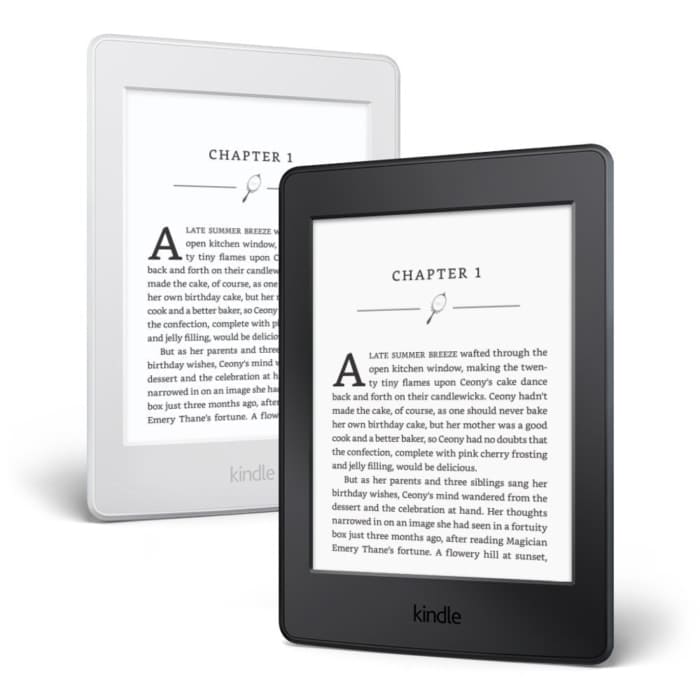Just Like Adults, Kids Aren’t Reading on Tablets and eReaders
A new report reveals that nearly 2/3 of kids in the US live in a household with either a tablet or ebook reader, but only about half that number have read on the device.
The Joan Ganz Cooney Center released a new report today which shares the results of their most recent survey into kids' media usage in the US. A total of 1,577 parents on how much time their 2 to 10 year old children spent with educational content on televisions, computers and video games.
According to the parents who participated in the survey, their kids read paper books an average of 29 minutes a day, but they only averaged 8 minutes reading on a computer and 5 minutes a day on either an ereader or tablet. The parents also estimated that their kids spent 56 minutes a day consuming educational screen media (this includes watching DVD, games, online research, and reading), so that 5 minute statistic is as low as it sounds.
But it’s also not a surprise. Just last week the Pew Research Center reported that half of American adults owned either a tablet or ereader, and 28% had read an ebook in the past year. This is fairly close to the figures reported by the Joan Ganz Cooney Center, which tells us that kids and adults are adopting ebooks at about the same rate.
The new report also tells us that parents believed that 44% of the time their kids spent using digital media was educational.Eight in ten children (80%) use educational media at least once a week, including a third (34%) who who use it daily. The more frequent users of educational media tended to cluster in the younger age groups, with the 2-to-4 year old group averaging 76 minutes a day (out of 97 minutes screen time). This ratio tended to reverse itself as kids got older, with 8-to-10 year olds spending 42 minutes a day on educational media (out of 2:36 screen time).
More than half (57%) say their child has learned “a lot” about one or more subject areas (e.g., reading/vocabulary, math, or cognitive skills) from educational media, and 54% say their child “often” takes specific actions as a result of their exposure to educational media, such as talking about something they saw
(38%), engaging in imaginative play based on it (34%), asking questions about it (26%), or asking to do a project or activity inspired by it (18%).
image by Harald Groven
![7300516238_bcfa7a6ae6[1]](https://the-digital-reader.com/wp-content/uploads/2014/01/7300516238_bcfa7a6ae61.jpg)

Comments
Binko Barnes January 24, 2014 um 4:13 pm
Most people don’t read. Period. Doesn’t matter if you are talking about tablets, ereaders, physical books, magazines or even websites. Most people, if they want to know something, don’t find a website where they can read about it – they find youtube videos that explain it.
There are those of us who love to read and grew up reading voraciously as kids and continued into adulthood. But we are fewer each generation.
William Ockham January 25, 2014 um 9:51 am
Actually, your perceptions are incorrect. Most people read books a little. The number of people who don’t read books was rising during the last 20 years, but that has stabilized. On a generational timescale, it really wasn’t that long ago that literacy reached near 100% levels. As best we can tell, the advent of the web and ebooks coincided with the turnaround in the falling rates of book reading.
cookie January 24, 2014 um 7:18 pm
Can somebody be considered a "reader" if they are strictly a news junkie reading RSS feeds all day from various news sites and blogs?
Nate Hoffelder January 24, 2014 um 7:54 pm
Yes. Reading is reading.
Binko Barnes January 25, 2014 um 2:34 pm
I assumed we were talking about people reading entire books. If you give people "reading credit" for RSS feeds you may as well give them credit for reading twitter posts or Facebook or just the onscreen instructions in a video game.
If you extend the definition of "reading" out that far, then we have almost 100% literacy outside of highly impoverished areas. But in the sense of reading novels and full-length non-fiction books younger generations are reading less.
Nate Hoffelder January 25, 2014 um 2:48 pm
Would your definition of reading include short stories? If so, what is your justification for excluding articles which are sometimes longer and better written than the short stories (better written than some genre fiction books, in fact)?
What is your justification for excluding the reading of an entire news section of a newspaper? That’s potentially more material than some short story anthologies, and the latter would most definitely be included.
Maria (BearMountainBooks) January 28, 2014 um 10:35 am
I read, but I’m a reader. I read newsfeeds and books. I just finished a book on my Kindle. The last 3 books I read were kindle, but the one before that was paperback. I will read anything and everything including the oatmeal box and the ingredients in toothpaste. I read blogs and I have a blog for readers. Short stories definitely count as reading. News articles definitely count as reading. The habit of reading on devices will continue to grow in my opinion. It’s just not the primary method right now unless you are already an avid reader!
Infographic: Tips to Help Children Refocus on Reading – The Digital Reader April 17, 2014 um 10:13 am
[…] aren’t spending much time reading ebooks these days, and even when they do they waste too much time with the enhancements, and there’s something […]
New Poll Shows the Majority of Americans Read eBooks – The Digital Reader April 17, 2014 um 11:05 am
[…] Pew Research Center, Joan Ganz Cooney Center, and other public interest groups have been recording the gradual rise in digital reading, but now there are signs that they may have been […]